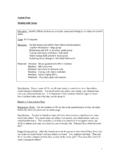Transcription of Dealing Effectively with Child Sexual Behavior Problems
1 Dealing Effectively with Child Sexual Behaviors By Brandy Steelhammer, MSW May, 2003 1 Dealing Effectively with Child Sexual BEHAVIORS By Brandy Steelhammer, MSW Children are Sexual beings. Take a slow breath and read that sentence again. Children are Sexual beings. Are you still with me? Keep breathing. Keep reading. The very thought of Child sexuality can send many parents into a sea of anxiety and denial. As much as we parents try to deny it, the fact remains that the majority of children will engage in Sexual behaviors at some point during childhood.
2 Child Sexual behaviors range from those that are normal and acceptable to those that cause Problems for the Child and others interacting with the Child . Parents need to be prepared to deal Effectively with the entire range. The following article is meant to give you some basic information and suggestions on how to approach Child sexuality. It is by no means a complete guide. Please refer to the recommended readings at the end of the article to further your understanding. Normal Sexual Behavior Children are curious about their own and others bodies, including genitals.
3 Some normal Sexual behaviors include showing private parts to each other, touching each other s private parts over clothing, watching others undress, or imitating adult kissing. You show me yours and I ll show you mine and playing doctor are common Sexual play incidents. Most parents can recall some of their own Sexual play when they were children. Keeping your own childhood experiences in mind might help you from overreacting when you find your Child involved in Sexual play. (Note: Parents who have been sexually abused may overreact to their Child s Sexual behaviors because of their own experience.)
4 Parents are strongly urged not to do this). Many important questions have to be asked when assessing if a Sexual incident should be considered normal or abnormal. If your Child has been sexually abused or has been over-exposed to adult sexuality (pornography, observing adults having sex), his/her Sexual Behavior is more likely to be a problem than that of a Child who has not had that history. Since children who have been adopted have a higher incidence of this type of history, adoptive parents need to pay extra close attention to their Child s Sexual behaviors to ensure that they are normal and healthy.
5 I recommend the booklet entitled Understanding Children s Sexual Behaviors: What s natural and healthy by Toni Cavanagh Johnson (2002). It helps parents and professionals assess normal versus abnormal Sexual Behavior in children. Below is a partial list of questions from her booklet that parents can ask when assessing a Sexual Behavior incident: 1. Were the children of similar age and developmental level? (YES) 2. Did each Child agree to engage in the Sexual incident? (YES) 3. Does the Child (ren) show as much interest in other areas of development (riding a bike, learning to read, playing soccer) as he/she shows in sexuality?
6 (YES) 4. Did the Child (ren) stop the Behavior when asked? (YES) 5. Did the Sexual incident involve adult Sexual acts (oral sex, intercourse)? (NO) 6. Did the Child (ren) show signs of anger, fear, or anxiety after the incident? (NO) 7. Are you correcting your Child s Sexual talk and Sexual play more often than you think you should have to? (NO) Dealing Effectively with Child Sexual Behaviors By Brandy Steelhammer, MSW May, 2003 2If your answers match the ones in the parenthesis, the Sexual incident may not be something to immediately worry about.
7 However, parents should document such incidents in order to have a thorough record of the Child s Sexual Behavior . Documentation should include details of who (ages, developmental level), what (specifics about the Behavior such as if the touching occurred over or under the clothes, which body part touched which body part), where (in the bushes in the front yard), when (mom was cooking dinner, dad was mowing lawn at about 5 pm), and situational information (incident occurred same week Child was told his best friend was moving, incident occurred same day Child saw provocative commercial about underwear).
8 Problem Sexual Behavior Children who have been exposed to domestic violence, neglect, abuse, and generally chaotic environments have often learned much more about sex than is appropriate. Some of these children have been sexually abused, have witnessed Sexual abuse, have seen pornography, and/or have been witnesses to adult Sexual acts in their homes. Because children s brains are not fully developed, they cannot make sense of sexuality the way that adults can. Therefore, thoughts or memories about inappropriate sexuality flood them and they act out as a way to cope.
9 These children are often referred to as sexually reactive meaning that they are reacting to their own unhealthy experiences of sexuality (Johnson, 2002). When these children act out sexually, their stress decreases, which reinforces the acting out. Therefore, children with Sexual Behavior Problems need to learn different, acceptable coping skills for decreasing stress. Once they have good coping skills, they can give up the unhealthy ones such as acting out sexually. Some children show that they are overwhelmed by Sexual thoughts or memories by talking about sex often.
10 These children turn non- Sexual experiences into Sexual ones. Examples include talking sexually after seeing a television commercial that shows someone taking a shower, after seeing a grandpa kiss his granddaughter on the cheek, or after seeing two young children put their arms around each other. Sexual comments now and then can be a normal part of growing up. Sexual comments daily or several times a week are not normal. Parents can use the questions from the previous section to assess if the Sexual Behavior is a problem.







